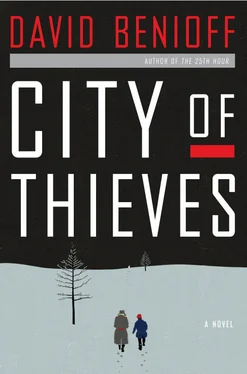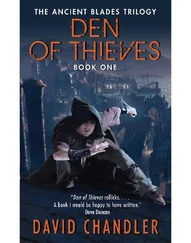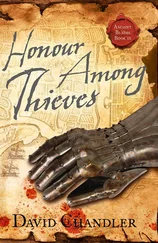Kolya made a great show of looking around the darkening woods, as if a doorway might be hidden in one of the tall pines.
“There is no inside,” he said. “You’re a soldier now, I’ve drafted you, and soldiers sleep wherever they close their eyes.”
“That’s very beautiful. But we need to get inside.”
He placed his gloved hand on my chest and for a second I thought he was angry with me, insulted by my unwillingness to brave the winter night outdoors. But he wasn’t admonishing me; he was making me stand still. He gestured with his chin to an access road that ran parallel to the train tracks. It was a few hundred meters away, and the shadows were growing deeper, but there was still enough light to see a Russian soldier standing with his back to us, his rifle slung over his shoulder.
“Partisan?” I whispered.
“No, he’s regular Army.”
“Maybe we’ve taken Berezovka back. A counterattack?”
“Maybe,” whispered Kolya. We crept closer to the sentry, treading carefully. We didn’t know any passwords and no one with a rifle would wait to see if we were truly Russian.
“Comrade!” shouted Kolya when we were fifty meters away, his hands raised above his head. I raised mine, too. “Don’t shoot! We’re here on special orders!”
The sentry did not turn. Many soldiers had lost their hearing in the last few months; exploding shells had ruptured thousands of eardrums. Kolya and I exchanged a glance and walked closer. The soldier stood knee-deep in the snow. He was far too still. No living man could pose like a statue in cold this severe. I turned a full circle, scanning the woods, convinced this was a trap. Nothing moved but the birch branches in the wind.
We walked up to the soldier. He must have been a brute in his day, with his bulging brow and his wrists thick as ax handles. But he’d been dead for days, his paper-white skin wrapped too tightly around his skull, ready to split. A neat little bullet hole, crusted with frozen blood, punched through his cheek just below his left eye. A wood sign hung from his neck on a wire loop, the phrase PROLETARIER ALLER LÄNDER, VEREINIGT EUCH! spelled out with a black marker. I didn’t speak German, but I knew the phrase, as did every boy and girl in Russia who had suffered through endless lectures on dialectical materialism: Workers of all lands unite!
I pulled the sign off the dead soldier’s neck, careful not to let the ice-cold wire brush against his face, and tossed it away. Kolya unfastened the strap of the rifle and inspected the weapon: a Mosin-Nagant with a crooked bolt. He tried it a few times, shook his head, and let it drop to the ground. The soldier wore a hip holster with a Tokarev pistol; a leather lanyard ran through a loophole in the hilt of the gun, securing it to the holster. The dead man was an officer, a pistol waver—the Tokarev wasn’t meant for Germans, it was for Russians who refused to advance.
Kolya drew the automatic, untied the lanyard, checked the pistol’s butt, and saw that the magazine had been taken. The ammo loops in the officer’s belt were empty, too. Kolya unbuttoned the man’s coat and found what he was looking for, a burlap pouch with a steel-buckled leather strap.
“Sometimes we put them under our coats at night,” he said, opening the pouch and grabbing three pistol magazines. “The buckle’s too shiny, reflects the moonlight.”
He slammed one of the magazines home and tried the action. Satisfied the pistol was sound, he stuffed it and the extra ammunition into his overcoat pocket.
We tried to pull the dead man out of the snow, but he was frozen into the ground, as rooted as a tree. Dusk was leeching all the colors from the forest; the night was almost on us; there was no more time to spare for corpses.
We hurried east, walking close to the tracks now, hoping that any Germans moving through the frozen woods would be in vehicles and easy to hear from a distance. The crows had quit cawing and the wind had stopped blowing. The only sounds were our boots sinking through the snow and the distant, arrhythmic drumbeat of mortar shells falling around Piter. I tried to hide my face behind the wool of my scarf and the collar of my overcoat, tried to use the warmth of my breath to heat my cheeks. Kolya stamped his gloved hands together and pulled his black fur cap down so low it almost covered his eyes.
A few kilometers east of Berezovka we walked along the perimeter of a large farm, the undulating fields of snow demarcated with low stone walls. Hay bales big as igloos sat abandoned in the fields, the harvest interrupted, the farmers fled to the east or dead. An old stone farmhouse stood at the far edge of the farm, protected from the northern wind by a copse of larch trees fifty meters high. Firelight shone through the mullioned windows, warm and buttery, spilling onto the snow in front of the house. Black smoke plumed from the chimney, barely visible as a curling smudge against the dark blue sky. It looked like the most inviting house ever built, the country residence of the emperor’s favorite general, heated and well stocked for Christmas with everyone’s favorite smoked meats and pastries.
I looked up at Kolya as we trudged through the snow. He shook his head but never took his eyes off the farmhouse, and I could see the longing in his expression.
“It’s a bad idea,” he said.
“It’s a better idea than freezing to death on the way to Mga.”
“Who do you think is in there? A country gentleman, sitting by the fire, petting his dog? You think we’re in a fucking Turgenev story? Every house in town was burned down, this one’s still standing. What happened, they got lucky? It’s Germans in there, the officers, probably. We’re going to storm the house with a pistol and a knife?”
“If we keep walking, we’re dead. If we go to the house and the Germans are there, we’re dead. But if it’s not Germans—”
“So let’s say they’re Russians,” he said. “That means the Germans let them stay there, which means they’re working with the Germans, which means they’re the enemy.”
“So we can appropriate food from the enemy, can’t we? And a bed?”
“Listen, Lev, I know you’re tired. I know you’re cold. But trust me, trust a soldier, this won’t work.”
“I’m not going any farther. I’d rather take a chance on the farmhouse.”
“There might be a place in the next town—”
“How do you know there is a next town? The last one is ashes. How much farther to Mga, another fifteen kilometers? Maybe you can make it. I can’t.”
Kolya sighed, rubbing his face with the back of his leather glove, trying to get some circulation going.
“I concede that we’re not going to make it to Mga. That’s no longer an issue. I’ve known for hours.”
“You didn’t want to tell me about it? How far away are we?”
“Far. The bad news is, I don’t think we’re going the right way.”
“What do you mean?”
Kolya was still looking at the farmhouse and I had to shove him to get his attention. “What do you mean we’re not going the right way?”
“We should have crossed the Neva hours ago. And I don’t think Berezovka is on the Mga line.”
“You don’t think… Why didn’t you say something?”
“I didn’t want you to panic.”
It was too dark to see the expression on his stupid Cossack face.
“You told me Mga is on the Moscow line.”
“It is.”
“You told me all we have to do is follow the Moscow tracks and they’ll take us to Mga.”
“Yes, all true.”
“So where the fuck are we?”
“Berezovka.”
I took a deep breath. I longed for powerful fists so I could pulp his skull.
“What’s the good news?”
“Pardon?”
Читать дальше












